#carlo collodi
Text
Guillermo Del Toro's Pinocchio got me thinkin'
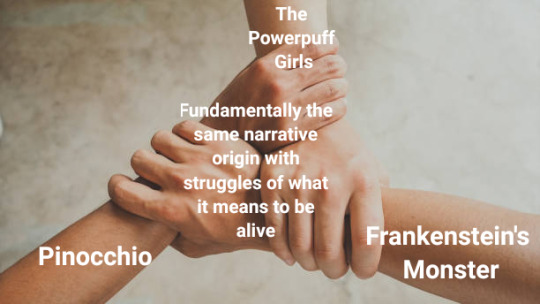
#pinnochio#powerpuff girls#frankenstein#frankenstein's monster#mary shelly's frankenstein#ppg#the powerpuff girls#guillermo del toro#carlo collodi
2K notes
·
View notes
Text
So ummm I tried to look up picture of the black psychopomp rabbits to show my friend…and turns out those things were from the book and not just something del Toro and McHale made up
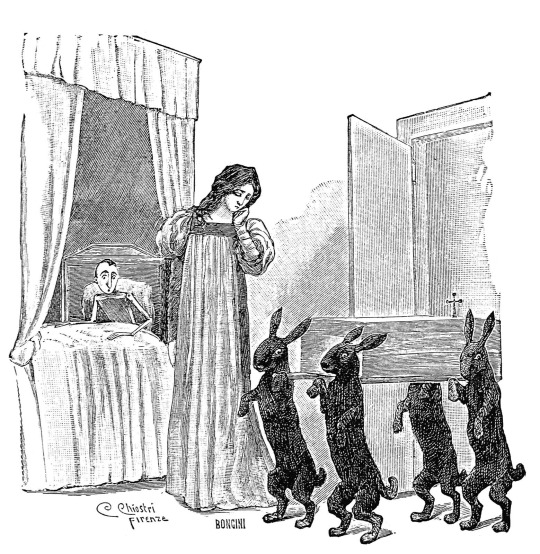
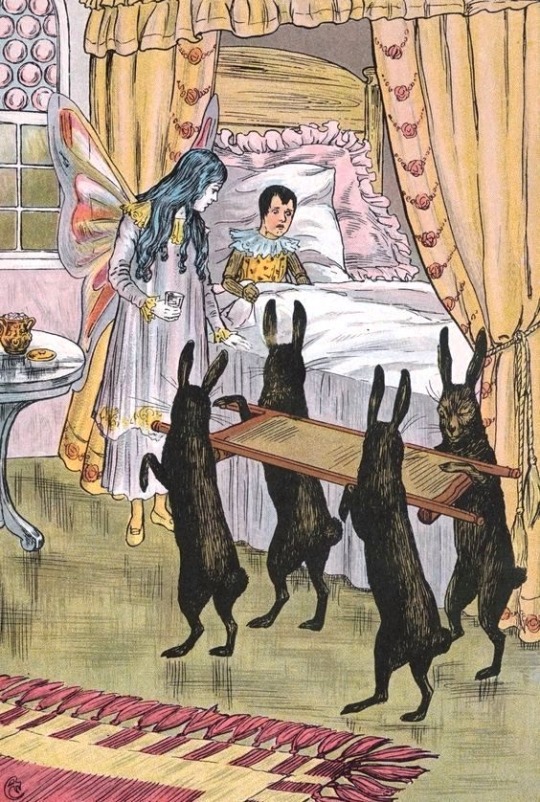
I mean this research expedition has been quite a rabbit hole (pun fully intended because I am terrible) of finding out how different the original 1940 Disney film (can confirm, I’m a dumb American LOL) is from the source material…and just how plain weird the book is to be frank. Like I would love to see an episode of Lost In Adaptation cover this.
#pinocchio spoilers#pinnochio#guillermo del toro's pinocchio#guillermo del toro#carlo collodi#oh and yes I mean Patrick McHale! apologies if you’re only NOW finding out about this#also in general: insert coffin dance meme here
2K notes
·
View notes
Text

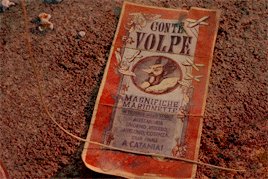

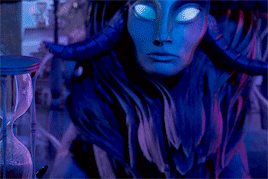


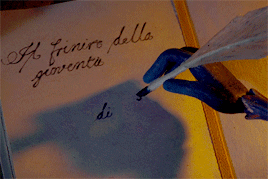



Guillermo del Toro's Pinocchio (2022)
#Pinocchio#filmedit#Ewan McGregor#Gregory Mann#Guillermo del Toro#Mark Gustafson#Carlo Collodi#my gifs#movie gifs
251 notes
·
View notes
Text
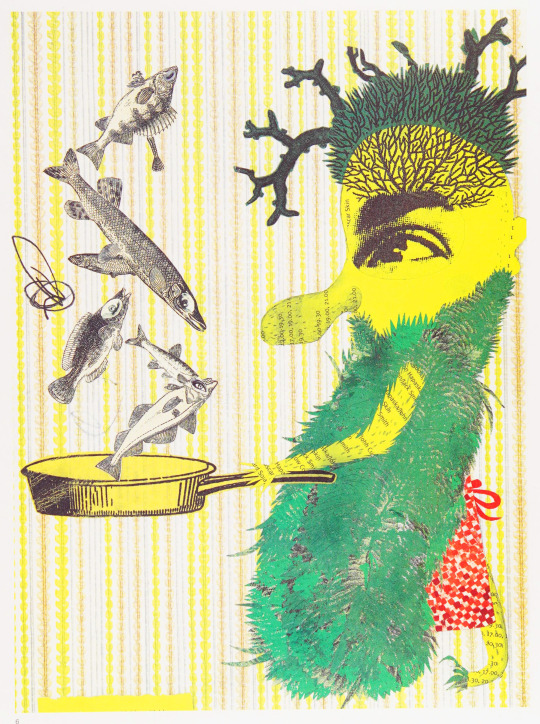
Sara Fanelli, ''Pinocchio'', 2003
Source
104 notes
·
View notes
Photo
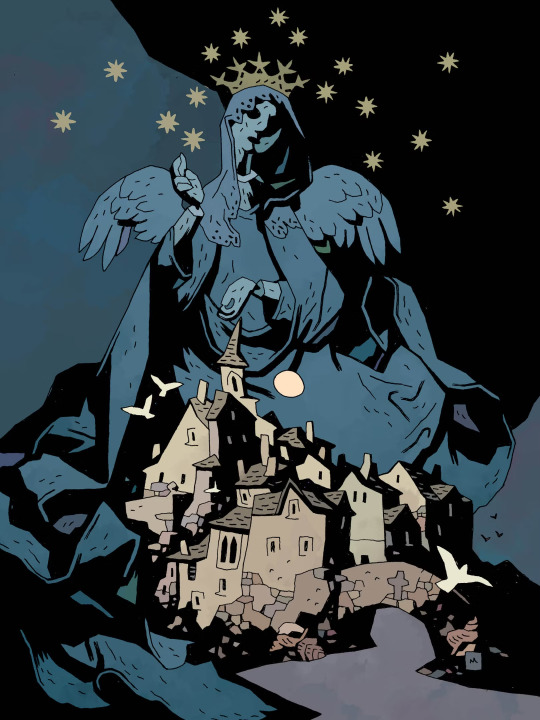


Pinocchio illustrations
Art by Mike Mignola
450 notes
·
View notes
Text
Lies of P - ENDING EXPLAINED, THEMES & FAQ
MAJOR SPOILERS MAJOR SPOILERS
ENDING SPOILERS UNDER THE CUT
By the way, this is not a lore analysis at all, this is a discussion on the thematic ideas in the story, and I refer to the player character interchangeably as "we" or P/Pinocchio. This is also all just my personal interpretations on the story, and is subject to inaccuracy.
Please enjoy my spark notes-esque analysis on Pinocchio souls!!
Was Carlo evil?
My answer is no. This is a bit complex, so I’ll try to answer within two questions.
In one of the endings, P surrenders his heart and Geppetto then uses it to revive Carlo, his biological son. Carlo then ends up killing everyone in the hotel if we choose to "save" him. He steps out into the rain, looks at Geppetto, and smiles (something that P doesn’t do), seemingly confirming his newly found humanity.

This does seem like a happy ending at first, doesn't it? By submitting to him, We/Carlo may win the purely conditional love of our father, but this comes at a cost. He has surrendered a part of himself in obedience. He no longer has any agency. Thereby making him a puppet in the ideological sense:

The game has a meaningful mechanic where our hair will grow during the duration of the game. Carlo's presented with short hair, but he's also wearing the same outfit (white blouse) we had in the train station; This is the version of ourselves from the beginning of the game. Like showing all that development we made is now gone for submitting to our father, we're right back to where we started, even as a "real boy”: a non-realized being who is at the call of someone else, a (Gasp!) puppet.
Why does Geppetto sacrifice himself instead of calling the attack off?
Let’s say instead of giving away the heart, we refuse. Geppetto, disappointed, then opens the suitcase he’s been carrying since the first trailer. He reveals the unnamed puppet boss, raises up the unnamed puppet on strings, and attempts to take the heart by force.
If you survive the first phase of the fight, P is able to slice the top his head off. There's then an animation of the "strings" around the nameless puppet being cut, becoming more ethereal.
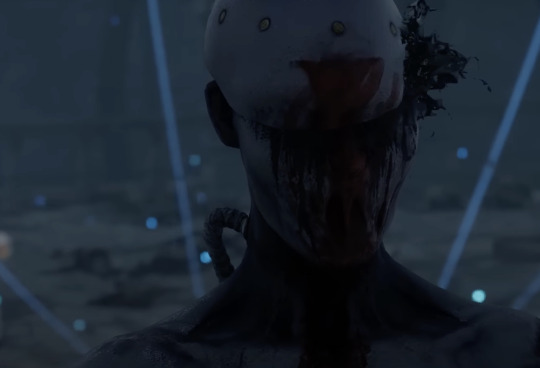

The fight goes on as it does, and then something strange happens. The nameless puppet seemingly defies Geppetto, and nonsensically attacks the heart Geppetto so needs in the first place, at which point he is so desperate for Carlo's revival that he dives in front of us.
Geppetto asks, shocked, "Were you trying to destroy Carlo's heart?"
What’s in the box?
Geppetto opens the suitcase we’ve seen him carrying since the first trailer, and raises up the nameless puppet. In the other ending, we can see that the body in the suitcase is indeed Carlo.

I think that Carlo/Nameless puppet regained some amount of sentience after being damaged. After the "real boy ending", Geppetto has him kill the rest of the people in Hotel Krat. Carlo being revived would mean Geppetto still has absolute control over his son.
Short answer: He lost control of the puppet in the second phase and it either sabotaged him or acted purely of its own accord to end the fight. I think the implication was that even Carlo knew being brought back was a bad idea. Damn :(
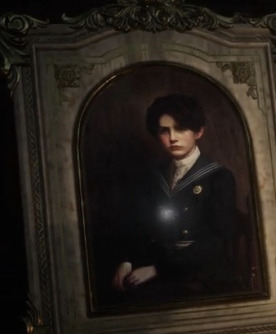
[note: people online have pointed out: It’s implied that Geppetto seems to have heavily neglected Carlo, and Carlo may have hated Geppetto in reality ("I don't care if an old man like that kicks the bucket!"). This reinforces the idea that the Carlo we see at the end is just a pawn.]
Is Pinocchio = Carlo?
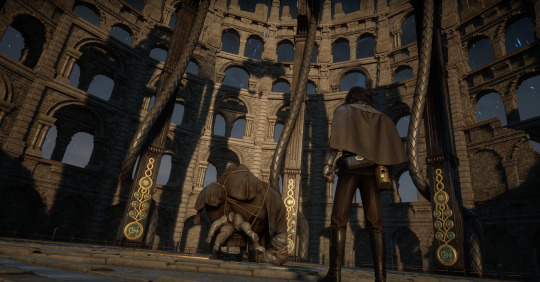
I think this is one of the more interesting points. This is either ambiguous or left unresolved by the game; but I think it's probably true that Pinocchio and Carlo are virtually the same person. If Geppetto had just accepted our/P's decision not to surrender the heart, he may have still gotten the son back that he always wanted anyway. But for all intents and purposes, the game seems to answer that it doesn't matter. Antonia's final letter to us rather profoundly chooses not to answer the question.
Why Antonia is a real one

This is Antonia's final message to us, contrasted with Geppetto's role with us as a parent in our final battle. [emphasis mine]
To the wonderful gentleman who gave my precious time back to me,
That time I met you was light itself.
Whether you're that child or not, I think you're a kind, precious child.
Thank you for giving my joy back to me in my last moments.
To the young gentleman who resembles Carlo,
Antonia Cerasani
[Remember, these are Antonia and Geppetto’s respective last words to us]
To be very fair, Geppetto was Carlo's actual parent; Antonia was not. But this seems to contrast with Geppetto asserting to us during the final boss sequence that we are just a puppet. The word "precious" is also very particular, as it's a word that Geppetto uses to refer to us near constantly ("Always remember that you're precious to me"/"it pains me to send someone so precious into such peril"). But while it could be read that we are only precious to him for ulterior reasons (because we carry the organ needed to revive Carlo), Antonia asserts that we are precious regardless. I see that as a truer, non-possessive love.
[also: Carlo's eyes are very noticeably brown (also seen in the painting), Our/P’s eyes are blue. Eyes, nearly always, have quite the symbolism! "The window to the soul", remember? While P and Carlo may have had a near-identical shell, I think this might be the game telling us that P and Carlo weren't truly the same. ]
Who’s a good boy?
Geppetto calls us "good boy" quite a lot. It's been fun watching various streams of this game, and whenever Geppetto calls us a "Good boy", I remember the chatroom filling up with messages of disgust, like: Good boy has real "Would you kindly" vibes! and: I squint my eyes at him every time he calls us a good boy like a dog.
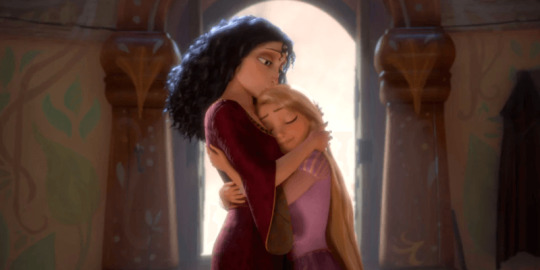
It really reminds me of Mother Gothel! When Mother Gothel calls Rapunzel "pet" and consistently dresses her in undersized dresses, she's infantilizing Rapunzel to take away her agency. Cleverly, each time she tells Rapunzel she loves her, she seems to be directing that love to her hair! She's also constantly touching and caressing it. She isn't interested in Rapunzel as a person, but in the functional idea of her. Geppetto also expresses discomfort seeing us age (our hair growing), in contrast to Sophia's honest and enthusiastic interest. It's symbolic of his disdain towards our growing self-autonomy (growth into an adult).
[Even in the last hug with P, it’s a basically a ruse to grab the heart, and he never gives P a second look when he collapses for dead on the floor.]
[To be somewhat sympathetic to Bad Dad Giuseppe (I'm not defending him), it's also probably because we are now growing past the age that Carlo died. Essentially, we're starting to outlive him, and Geppetto has to witness the growing that Carlo never got to reach. That's got to be hard to bear.]
What does P actually stand for?
P stands for Puppet, Not Pinocchio
People have noticed since the demo that we are never actually, explicitly referred to as "Pinocchio". The NPCs seem to dodge around saying "Pinocchio", opting for words “like Geppetto's puppet" or “child” instead. Given the story's inspiration and the game's title, however, it could be inferred that our name is Pinocchio. Why not just call us by name?
Well, the doylist interpretation is that maybe they just didn't want to stir up some kind of trademark trouble with a certain Walter Mouse. But the game does something clever with this, lore-wise. After our "betrayal" at the hands of our father, I think the big reveal is simply that we are unnamed. Giuseppe gave us no name, showing he didn't view us as a true autonomous being.

Why does Geppetto apologize in the alternate "good ending"?
Both the endings are near identical, but when Geppetto is beginning to curse Pino, he apologizes instead. The beginning of the end cutscene is the same as the second “good ending”, where Geppetto tells us that we’re “just a useless puppet”. He's beginning to say this, except for when he sees the tear fall, at which point he seems to relent.
I think it's supposed to imply, seeing Pinocchio seemingly mourning for him, that in the very last moment Geppetto understood that either 1. Pinocchio was truly Carlo or 2. that he was sentient enough to be his tangible son anyway.
Is Pinocchio still alive? (+ Collodi's journey to Adulthood)

I think so!
If you've taken certain paths, you unlock the third ending, which is like the second ending, except with an additional scene where we can see P returning to the Alchemist's tower to look at a peaceful Krat. P then uses the ergo from Sophia into a puppet replica, at which point he collapses, seemingly from exhaustion. Sophia cradles him as he sleeps and serenely tells us it's good to see us again.
In the book, Pinocchio, after travailing to support both his ailing father and the sick blue fairy, falls asleep and dreams that he is visited by the blue fairy. The fairy, now whole and healed, tells him he hasn't been the best son, but that boys who support their parents are "deserving of great praise". When he wakes, he is a human boy, and his puppet form lies lifeless on a chair. It isn't Pinocchio showing pure obedience that makes him into a real boy, but the selfless act of caring for his father (the reversal of the parent-child structure). In my interpretation - her final message is this: That he was never perfect, (and perhaps he would never be perfect), but the bottom line was that he loved his father, and that was enough to make him human. [I think there's something in my eye!]

(Easter - The Resurrection of Christ, Rebirth, Death and renewal, Spring)
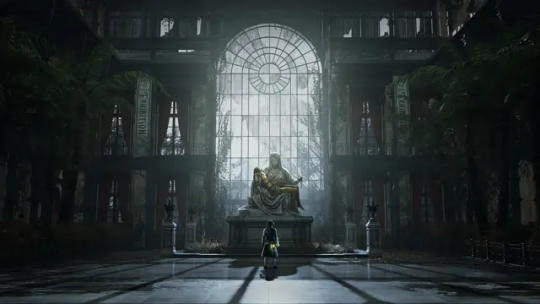
In case you don't know (I didn't btw), the statue in the Exhibition is actually Michelangelo's La Pieta. Its inclusion in the game not only alludes to the novel's Italian origins, but also serves as a central visual motif as it's representing Jesus's death in the arms of Mary. This visual motif is revisited by P and Sophia at the end of the game in the “true” (canonical) ending. Symbolically, In the selfless act of reviving Sophia and at the end of his journey, he has transcended and broken the "egg shell of his puppet body" into a true adult (a human being).
Does lying make us human?
At the centre of Collodi's Pinocchio is a father-son relationship wherein underlies an unconditional love. But this game has quite the different father-son relationship. When puppets are made, they are meant to follow under the laws of the Grand Covenant, and our father is the father of all puppets. Namely, each time we lie, this is in defiance of our father figure. Remember, the rule is that a puppet cannot lie. Lying doesn't have the connotation it has in the book or in popular culture adaptations of Pinocchio. Rather, lying in the game seems to infer choice and not deception.
It isn't just the act of disobedience (Self-agency) that gives us our autonomy ("A man chooses", mirroring Bioshock), In many cases in the story, we are asked if it’s better to comfort someone with a lie than telling them a truth that maybe wouldn’t serve them. In that way, you can also view lying as the selfless act of taking a burden.

Again, this adapts Collodi's psychological ideas in the book on the growth of the self-interested nature of the hedonistic, narcissistic child into the empathetic "adult" that works to serve others. [I know I might come across as harsh here, but bear with me, I’m just trying to speak in literary terms.] But while Collodi's Pinocchio focuses on the selfless nature of a parent, Lies of P focuses on the self-agency of an adult.
So why is Lies of P so dead serious about Pinocchio? Well, it's an elaborate metaphor for self-autonomy.
In Conclusion…
Does Lies of P have an identity issue in of itself? Great soulslike? PuppetBorne 2.0? But it's also a beautifully rendered Pinocchio adaption. Quite unusual, perhaps, but there's a quote that bizarrely enough comes to mind when I think of the audacity of a Pinocchio themed soulslike - Talent is hitting the target nobody else can hit, while genius is hitting the target nobody else can see. I think there is a reason why the tale of Pinocchio persists and persists.

138 notes
·
View notes
Text







LIES OF P (2023)
Please follow me on Instagram for more: https://www.instagram.com/screencaptureart/
#lies of p#ps4#ps4share#pc#xbox#xbox one#ps5#xbox series#playstation#ps5share#soulslike#xbox game pass#pinocchio#carlo collodi
146 notes
·
View notes
Photo
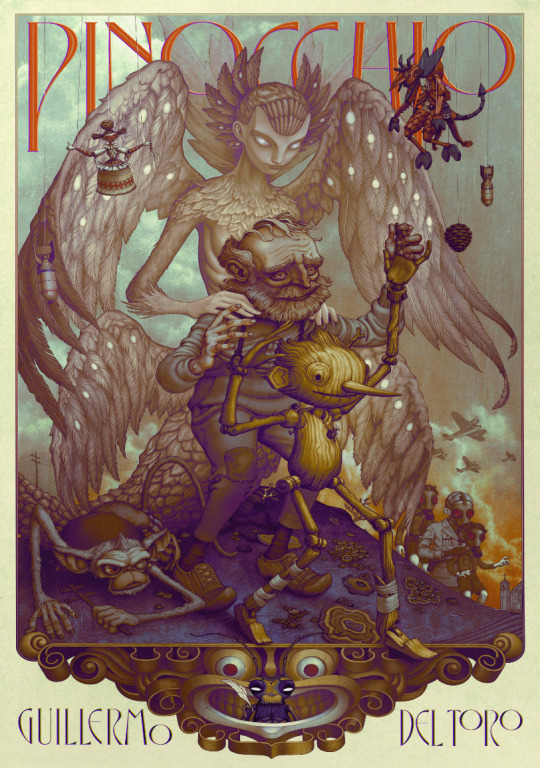

Netflix has released merchandise for Guillermo del Toro's Pinocchio. James Jean's artwork comes on 14x24 archival prints ($100), as well as T-shirts ($30), sweatshirts ($45), hoodies ($50), and tote bags ($30).
A Pinocchio marionette, limited to 250, is available for $275 in collaboration with iam8bit. Hand-crafted by Rici Marionettes, the wooden puppet measures 10" tall and comes with a 1.6" pewter cricket.
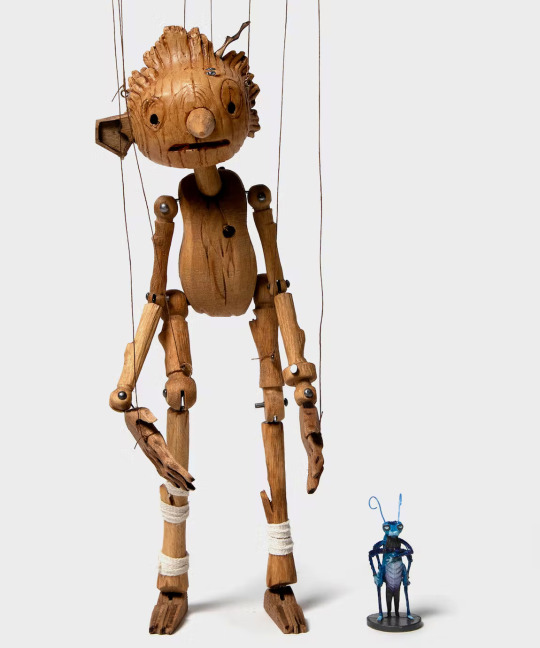
#pinocchio#guillermo del toro#mark gustafson#guillermo del toro's pinocchio#netflix#carlo collodi#the adventures of pinocchio#art#toy#gift#Rici Marionettes#james jean#iam8bit#gregory mann#ewan mcgregor
686 notes
·
View notes
Text
I would like to point out that Geppetto’s son, Carlo, was probably named after Pinocchio’s writer, Carlo Collodi, which I think is kinda neat
461 notes
·
View notes
Text
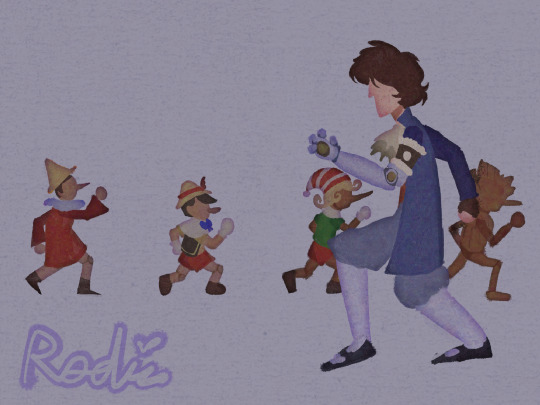
same as it ever was
#rodiart#pinocchio#disney#carlo collodi#lies of p#lies of p fanart#buratino#guillermo del toro#gdt pinocchio
82 notes
·
View notes
Text
A hypothetical look at the childhoods of Carlo and Romeo
Despite Carlo and Romeo being two of the most central characters of Lies of P, what we know about their backstory is next to marginal. We know that the two of them went to school together and were best friends (perhaps even more than that), but their time in Monad Charity House is only presented in snippets and fragmented memories, and despite being highly significant, their characters remain elusive - like shadows cast over the entirety of the story, always present, never tangible.
Thus, many have filled the gaps left in their characterization with their own imagination. As for myself, I was curious what their early lives might have been like, before they met at Monad Charity House - and since it was the closest thing to the game's setting I could find, I did some research on Victorian children and their upbringing.
What I found out, however, left me absolutely shocked and made me keenly aware of just how awful Carlo and Romeo's childhood must have been, going by historic standards. As pretty much everything during the Victorian Era, a child's upbringing was very dependent on social class - however, no matter if you grew up in a rich or poor family, each came with its own kind of suffering, and regarding the question of "What were Carlo and Romeo's lives like before Monad Charity House?", the brief answer would be: "Probably not great."
As for the long answer... I should mention this is my own interpretation of Carlo and Romeo's backgrounds, and none of this is officially confirmed. However, given what we know about the two's origins, I consider it quite plausible, and what we can conclude from it might not only give us better insight into their personalities, but also some of the real-life background behind the original fairy tale of Pinocchio.
Just as a fair warning, though: This is about to get a little depressing.
[Spoilers for Lies of P!]
[CW: mentions of very questionable parenting methods, depression, suicidal ideation, poverty, parent death, child labor, abuse and exploitation of children]
Carlo
For this analysis, I'm going to assume that Carlo was born into a fairly well-off household. (The description of Carlo's portrait calls him "an aristocratic boy", and since Geppetto is the mastermind behind Krat's puppet technology, I assume he'd have his fair share of the profits.)
By the standard of their time, upper-class children were quite spoiled: Unlike their working-class peers, they never had to worry about who was going to provide food for them, and the horrors of child labor were never of any concern to them. You would think that being born into a rich family doesn't leave you a single thing to wish for - you'd have nice toys, fine clothes... and well, everything, except for parental affection.
For the most part of the day, upper-class children wouldn't even see their parents - they were only summoned to appear before them at a set hour of the day, and during these occasions, they had to address their fathers as "sir". Essentially, meeting your parents was more like an audience with a stranger, a rare privilege strictly regulated by formality. Children were expected to act prim and proper, only allowed to speak when spoken to, and thus unable to express their true feelings, thoughts, or opinions. Any show of affection was extremely rare - Winston Churchill (1874 - 1945) once remarked that he could "count the times he had been hugged by his mother" as a child.
The parents were more or less completely absent from their children's lives, and when there actually was interaction between them, the children were expected to unconditionally obey their parents. Osbert Sitwell (1892 - 1969) once commented: "Parents were aware that the child would be a nuisance and a whole bevy of servants, in addition to the complex guardianship of nursery and school rooms was necessary not so much to aid the infant as to screen him from his father or mother, except on some occasions as he could be used by them as adjuncts, toys or decorations." (Can you imagine? Geppetto taking Carlo to some big social event to show off his "perfect little son", and Carlo just standing there and silently enduring the ordeal, looking at his father all the while and wondering "Did he ever realize I'm not one of his puppets?")
So, by the standard of the time period Lies of P is set in, Geppetto neglecting his son isn't even anything terribly unusual - in fact, that's perfectly normal Victorian upper-class parent behavior.
Since they didn't take care of their children themselves, upper-class parents would hire a nanny to raise them. Nannies would be instructed what kind of behavior and morals the parents wanted instilled into their child, and they would be responsible for their education as well as teaching them manners, propriety, how to dress and so on. As such, the nanny effectively acted as a substitute for the parents - and given that maid puppets exist and Geppetto probably wouldn't let any strangers near Carlo, Carlo's nanny was most likely a puppet as well.
The daily life of upper-class children was based on strict routine - some like to say it operated with "clockwork regularity". Breakfast would be served at 8 o'clock in the morning, dinner at 12 o'clock, and tea at 6 o'clock.* Children would very seldom leave their room, except to take short walks in the park with their nanny. Education would mostly be given at home by a tutor, which included basic lessons like reading, writing, and arithmetic, but also "socially appropriate skills" like dancing and playing the piano. (Since we see a puppet giving piano lessons to a child in the intro, chances are Carlo's tutors were also puppets.)
*Eating times varied throughout the Victorian Era; a "dinner" might also be a meal eaten during midday.
The rest of the time, children would have nothing to do but to play with their toys (except on Sundays, which was forbidden). Rich families had the luxury of being able to afford the most elaborate of toys, such as automated dolls, clockwork trains, and jack-in-the-boxes, which were extremely popular among children. In fact, since clockmakers were also the ones to build toys, I could imagine Geppetto actually made the toys for Carlo himself. (However, I feel like this only would have made Carlo loathe them; in his eyes, it would've been proof that "father pays more attention to the toys he makes for me than actually looking at me".)
In short, the life of Victorian upper-class children was lonely, depressing, and stuffy to the point of suffocating. Given these circumstances, I would actually be surprised if this didn't leave mental scars on Carlo. It has been documented that a lack of parental affection causes psychological issues lasting all the way into adulthood, such as low self-esteem, trust issues, anxiety, difficulty with social relationships, and lack of emotional control. Also, considering Carlo was probably surrounded by puppet servants all day, he wouldn't even have had a single human being to interact with most of the time - something which most likely had a detrimental effect on his psyche.
Given this dreary existence, it would make absolute sense for Carlo to look nothing short of depressed in every depiction we see of him. The feeling of emptiness when being pressed into the corset of others' expectations is actually something I'm well acquainted with - it feels like walking beside yourself, like your body moving while actually feeling dead inside. A bit like a puppet on strings, if you will. With his life being a monotonous routine controlled by someone else, it wouldn't be surprising if Carlo had difficulty still seeing a purpose in it. (There have been some theories going around that Carlo committed suicide; at the very least, I think it's highly likely he had suicidal ideations during his youth.)
Perhaps this is where Pinocchio - the character from the fairy tale - might have become something like an identification figure for Carlo. Pinocchio was a puppet, but instead of doing what his creator intended - what his father expected - he did whatever he wanted. I'm sure Geppetto gave him the book as a measure to educate him, but it ended up having the opposite effect. In fact, it might have been what first taught him the concept of freedom: Geppetto's puppets only ever did what he told them to, executing the exact actions he had programmed them with, over and over again - but Pinocchio showed Carlo that it didn't have to be this way. (I've seen a lot of interpretations of Carlo disliking puppets, and while I can see where this is coming from, I don't think this is because Carlo disliked puppets in general. Rather, I think he saw them as "extended arms" of his father and a symbol of his need to control everything around him; otherwise, it would be a little strange for Carlo to be attached to the story of Pinocchio so much.)
However, I think beneath all the pent-up frustration and hatred, there was also the wish for his father to love and appreciate him. At the end of the book, Pinocchio returns to his father after all the hardships he had to go through, and the two reconcile and live happily ever after. Since Pinocchio's father goes looking for him when he disappears, perhaps Carlo believed that if he rebelled against him and put himself in danger, Geppetto would realize that he actually cared for him.
So, if Carlo was very prone to temper tantrums and acting defiantly towards his father, it might have been on one hand to show that he didn't want to be part of Geppetto's perfect stage play anymore, and on the other because he was vying for his attention. Due to his upbringing, however, Carlo wasn't really able to communicate his feelings in a proper way. (I like to imagine Carlo as a very emotional person, but having difficulty to actually express his feelings.)
Geppetto, however, wouldn't have the sensitivity to understand this - he most likely would've tried to rectify his son's "mischievous behavior" by disciplining, as was typical for the time period (in general, it was believed that you had to "beat the evil out of children" for them to become a good person). Of course, that wouldn't have made things better - in fact, I wonder if part of the reason Geppetto sent Carlo to Monad Charity House was that he was just at a loss what to do with the boy. Since all of his educational measures were fruitless, perhaps he thought that sending him to the boarding school would finally put Carlo on the right track - although the result of that probably was also quite different from what Geppetto expected.
Romeo
Meanwhile, poor Victorian children had to live in a completely different, brutal reality - for them, day-to-day life was a literal struggle to stay alive.
We know that Romeo was an orphan, and according to Eugénie, that's not much of a rarity in Krat. Indeed, street children existed in abundance during Victorian times: It wasn't uncommon for working-class children to lose one or both parents - due to unsanitary conditions in Victorian slums, many people died of disease, and given the hazardous working conditions in factories and coal mines, accidents were commonplace. However, the term of a Victorian orphan was actually a little broader than that, also extending to children who ran away from home due to hailing from alcoholic and neglectful families. Often, mothers who were single or had a child out of wedlock would also simply abandon their children. Whatever the reason for their situation, these children were forced to fend for themselves at a very young age.
In the Trinity Sanctum in Krat Central Station, there's a note mentioning a "pickpocket who was overconfident in a gamble" and "had his heart stolen and died". Since Romeo made "a deal with the devil" (the "devil" presumably being Geppetto who turned him into a puppet), people have interpreted this as referring to Romeo. Turing to crime to support themselves was not a rarity among poor Victorian children - in fact, half of the defendants tried at the Central Criminal Court of England and Wales between 1830 and 1860 were aged 20 or younger. There were even organized gangs of child thieves who were trained in pickpocketing by a "captain", similar to those from Charles Dickens' novel Oliver Twist. (However, the items that were stolen most often were actually not purses or pocket watches, but handkerchiefs; silk handkerchiefs had a pretty high resale value, and the thieves would take them from pockets, rip out the initials, and resell them for a good price.)
We can't be sure whether Romeo teamed up with a few other kids or not, but personally, I'd wager he did - it would be much safer to operate in a group in case one of them gets in trouble, and overall, Romeo's personality seems a bit too caring for a lone wolf. (As the King of Puppets, he was not only determined to save as many humans as possible, but also possessed the unconditional trust and loyalty of the other puppets. To me, this means he most likely cared about them, and they cared about him in return - if it was just programming, the puppets probably wouldn't be lamenting his loss after he dies. Compare this to Geppetto, who has to use force and coercion for others to obey him.)
Also, since the notes in the Trinity Sanctums always seem to have a connection to the place where they're located (factory worker -> factory; cleric -> cathedral; "greatest singer"/Adelina -> opera house), that would mean the train station was most likely Romeo's base of operations.* (Train stations tend to be very popular among thieves, since it's easier to pick pockets in the confusion of people boarding or getting off trains.) This would imply that Romeo didn't grow up in Monad Charity House since he was an infant, but arrived there at a later point during his childhood.
*EDIT: I just had a thought that the note in the Trinity Sanctum could also mean the train station is the place where Romeo died. (All the other notes are connected to murder or some other violent action, and since we can assume they were written by Arlecchino, he was probably more interested in that.) Since Geppetto has his secret workshop wagon in Krat Central Station, maybe the place where he built P is the same where he built Romeo.
Since there were so many orphaned children, the few orphanages that existed couldn't receive all of them. Instead, workhouses were established as institutions for all kinds of destitute people - including orphans - who were unable to support themselves and were given lodging and food in exchange for labor. However, many children actually preferred living on the streets, rather turning to crime than going to the workhouse. At a first glance, this may seem a bit unreasonable - surely, not having to run around in worn-down rags and steal your food just to survive would at least be an improvement?
Well... Turns out, not really. The conditions in Victorian workhouses were notoriously awful - they were overcrowded, unsanitary, and cruel places to live. Daily routine was strictly regimented, consisting of 9–10 hours of repetitive and physically demanding labor and very little free time. What little food there was was of poor quality, privacy was basically nonexistent, and the dozens of inmates sleeping together in dormitories often had to share their beds - children usually had to sleep up to four in a bed. The consequences for refusal of work or any kind of rule violation were beatings, deprivation of food, being locked up in solitary confinement in a dark cell, and other draconian punishments.
If this doesn't sound like a very hospitable atmosphere, that's because that was the exact intention behind it. Workhouses weren't meant to support poor people - they were supposed to scare them into finding work and make a living for themselves. Victorians viewed poverty as a self-imposed misery, and if you were a pauper, that was because you were lazy, retarded, or made bad choices in life. That's why beggars, vagrants, orphans, criminals, and mentally ill people were all indiscriminately housed in workhouses, because from the Victorian point of view, they all belonged to the same category of people: A stain that had to be removed from the public eye, either by forcing them to support themselves or by making use of their work force once they had donned the workhouse uniform. They were a nuisance to society, and their treatment in the workhouse was sure to make them feel that.
One of the worst fates for workhouse children, however, was to be hired out as pauper apprentices: Usually from 10-13 years of age, but sometimes as young as eight or seven, workhouses would send pauper children to factories in the countryside for an "apprenticeship". This "apprenticeship" involved factory owners buying children from orphanages and workhouses and making them sign a contract that lasted until they were 21 years of age, dictating that the apprentices had to be provided with food and accommodation, and in exchange, the factory owner was free to make use of their working power.
So in summary, workhouse orphans were essentially sold into slavery. This was all that much easier to do with children who had no parents and no other means to support themselves, and thus were free to be exploited by their employers. Some of the recollections from these former pauper apprentices are just utterly horrific - and in this case, I think it's appropriate to let the victims speak for themselves.
John Birley, who lost his father when he was two, lived in the Bethnal Green Workhouse for a time after his mother died of illness when he was around six. He was sent to Litton Mill as a pauper apprentice, and he had this to say about his experiences in an interview with The Ashton Chronicle in 1849 (source):
The same year my mother died, I being between six and seven years of age, there came a man looking for a number of parish apprentices. We were all ordered to come into the board room, about forty of us. There were, I dare say, about twenty gentlemen seated at a table, with pens and paper before them. Our names were called out one by one. We were all standing before them in a row. My name was called and I stepped out in the middle of the room. They said, "Well John, you are a fine lad, would you like to go into the country?" I said "Yes sir".
We had often talked over amongst ourselves how we should like to be taken into the country, Mr. Nicholls the old master, used to tell us what fine sport we should have amongst the hills, what time we should have for play and pleasure. He said we should have plenty of roast beef and get plenty of money, and come back gentlemen to see our friends.
The committee picked out about twenty of us, all boys. In a day or two after this, two coaches came up to the workhouse door. We were got ready. They gave us a shilling piece to take our attention, and we set off. I can remember a crowd of women standing by the coaches, at the workhouse door, crying "shame on them, to send poor little children away from home in that fashion." Some of them were weeping. I heard one say, "I would run away if I was them." They drove us to the Paddington Canal, where there was a boat provided to take us.
We got to Buxton at four o'clock on Saturday afternoon. A covered cart was waiting for us there. We all got in, and drove off to the apprentice house at Litton Mill, about six miles from Buxton. The cart stopped, and we marched up to the house, where we saw the master, who came to examine us and gave orders where we were put. [...]
Our regular time was from five in the morning till nine or ten at night; and on Saturday, till eleven, and often twelve o'clock at night, and then we were sent to clean the machinery on the Sunday. No time was allowed for breakfast and no sitting for dinner and no time for tea. We went to the mill at five o'clock and worked till about eight or nine when they brought us our breakfast, [...]
We then worked till nine or ten at night when the water-wheel stopped. We stopped working, and went to the apprentice house, about three hundred yards from the mill. It was a large stone house, surrounded by a wall, two to three yards high, with one door, which was kept locked. It was capable of lodging about one hundred and fifty apprentices. Supper was the same as breakfast - onion porridge and dry oatcake. We all ate in the same room and all went up a common staircase to our bed-chamber; all the boys slept in one chamber, all the girls in another. We slept three in one bed. [...]
Mr. Needham, the master, had five sons: Frank, Charles, Samuel, Robert and John. The sons and a man named Swann, the overlooker, used to go up and down the mill with hazzle sticks. Frank once beat me till he frightened himself. He thought he had killed me. He had struck me on the temples and knocked me dateless. He once knocked me down and threatened me with a stick. To save my head I raised my arm, which he then hit with all his might. My elbow was broken. I bear the marks, and suffer pain from it to this day, and always shall as long as I live.
I was determined to let the gentleman of the Bethnal Green parish know the treatment we had, and I wrote a letter with John Oats and put it into the Tydeswell Post Office. It was broken open and given to old Needham. He beat us with a knob-stick till we could scarcely crawl. Sometime after this three gentlemen came down from London. But before we were examined we were washed and cleaned up and ordered to tell them we liked working at the mill and were well treated. Needham and his sons were in the room at the time. They asked us questions about our treatment, which we answered as we had been told, not daring to do any other, knowing what would happen if we told them the truth."
In case there were any surviving family members, the children were sometimes deported without their knowledge. In 1849, Sarah Carpenter related the story of her lost brother who was taken away from Bristol Workhouse to The Ashton Chronicle (source):
When I was eight years old my father died and our family had to go to the Bristol Workhouse. My brother was sent from Bristol workhouse in the same way as many other children were - cart-loads at a time. My mother did not know where he was for two years. He was taken off in the dead of night without her knowledge, and the parish officers would never tell her where he was.
It was the mother of Joseph Russell who first found out where the children were, and told my mother. We set off together, my mother and I, we walked the whole way from Bristol to Cressbrook Mill in Derbyshire. We were many days on the road.
Mrs. Newton fondled over my mother when we arrived. [...] My brother told me that Mrs. Newton's fondling was all a blind; but I was so young and foolish, and so glad to see him again; that I did not heed what he said, and could not be persuaded to leave him. They would not let me stay unless I would take the shilling binding money. I took the shilling and I was very proud of it.
They took me into the counting house and showed me a piece of paper with a red sealed horse on which they told me to touch, and then to make a cross, which I did. This meant I had to stay at Cressbrook Mill till I was twenty one.
So, if the situation in the Lies of P universe in any way resembles that during the real-life 19th century, and if these street children are in any way smart, I think it's very understandable they'd want to stay the hell away from the workhouse or any similar institution. Of course, it would be easy to attribute this to laziness, but honestly, I'd say they just wanted to avoid the abuse. (You could pose the question whether there are even any lowly paid jobs for children to do in the LoP universe, since a lot of those were probably taken over by puppets. However, if you ask me, that might only lead to employers trying to underbid the price that puppet laborers would cost, which would lead to serious wage cuts for any human workers - we know there was a violent protest of the factory labor union, which might have happened for a reason like this. Also, I reckon the puppet industry itself would create new branches of "dirty work", like recycling parts from scrapped puppets, disposing of puppet junk, etc.)
In fact, these harrowing stories happen to have quite a few parallels to the original fairy tale of Pinocchio. Did you notice? The children are taken away in coaches and carts, in a way that conceals their presence (e.g. in a covered cart or in the dead of the night), which is very reminiscent of the Coachman picking up boys at night (in the book, the coach is described as having wrapped wheels, so it doesn't make noise and can't be discovered). At first, the children are told they can make a fortune by working in the textile mills and will have plenty of time for leisure - in A memoir of Robert Blincoe from 1828, it's even mentioned they tried to lure children into working in a cotton mill by telling them that "they would be transformed into ladies and gentlemen" when they arrived there, that "they would be fed on roast beef and plum pudding, be allowed to ride their masters' horses, and have silver watches, and plenty of cash in their pockets". This sounds quite similar to the Coachman promising the boys unlimited play time and freedom if they come with him to the Land of Toys. However, as both the pauper apprentice children and the boys from Pinocchio had to realize, all of this was a fraud to exploit them for what is essentially slave labor.
This also suggests that with his depiction of the Land of Toys, Carlo Collodi was doing more than just telling a horror story to scare kids into behaving. He was commenting on a real-life problem - and this, exactly this, is what Collodi wanted to warn his young readers about. In that sense, the boys turning into donkeys might also be a metaphor for what their employers saw them as: livestock, to be used and abused as they pleased.
Because the living conditions of workhouse children were so appalling, there was clamor for change, specifically among the reformist middle class. It was argued that orphans and destitute children should be housed in an institution meant exclusively for them, rather than together with criminals, cripples, and lunatics. The movement really began to pick up speed in mid-19th century, and many orphanages were founded by private benefactors and philanthropists. One of the most influential was Thomas John Barnardo, the founder of the charity Barnardos, who built homes for waifs, strays, and all kinds of children in need to provide them with a place to live, food, and education.
In general, there was an effort to make education accessible to even the lowest classes. Sunday Schools and Ragged Schools were established, which allowed poor children to take classes without having to pay a fee, giving them more opportunities in later life. However, the parents of working-class children were often against them going to school, since it meant that they couldn't work to earn additional income for the family. This is why attending school was made mandatory for all children between 5 and 10 in 1870, with the leaving age being raised to 11 in 1893. (This is also what Carlo Collodi meant by saying "for the love of God, get yourself some education" - because if you didn't, you would be stuck in a circle of bone-breaking labor forever.)
The Monad Charity House fits quite well into this historical frame: We do know that the Rose Estate was originally a charity organization for poor children, but was turned into a boarding school after Lady Isabelle and the Monad family started sponsoring money. Since charities for poor children are a phenomenon of the mid- to late-19th century, it's possible the situation was a lot worse before in the Lies of P universe as well. Romeo might not have gone there willingly (perhaps he was caught during one of his thefts), and truth be told, Victorian schools weren't the most rosy of affairs (if you'd like to know the details, feel free to check out this page). However, given what could've been his fate, Romeo probably considered himself lucky to be alive and not exploited by someone else for donkey work. (Still, one thing that should be kept in mind is that the Alchemists' patronage of the Rose Estate probably isn't based on purely altruistic motives: Since all of the children are trained as Stalkers, Alchemists, or Workshop Technicians, all of them ultimately become part of Krat's economic apparatus.)
It seems almost miraculous that two boys coming from such different worlds would develop such a strong bond. However, despite this, they had one experience in common: pain. Although the way in which they suffered might have differed, they both knew what it's like to be abandoned. Romeo had to grow up in a society that didn't care whether he lived or died, and since all Carlo ever received from his father was scrutiny or cold ignorance, he probably felt the same about him. Living in a cruel world where the odds were stacked against them, it's easy to see why these kindred souls sought comfort in each other.
In any case, if the untold backstory of these characters was crafted with this in mind, my sincerest compliments go to the people of Neowiz for not only taking such a nuanced approach to child education in a historical context, but also for doing so with respect to the original story by Carlo Collodi. It may be really subtle at times, but you can't deny how much effort the devs put into the themes - themes that are so universal to human psychology that they continue to be relevant today, and undoubtedly made the story resonate with a lot of people.
#lies of p#lies of p carlo#lies of p romeo#lies of p geppetto#analysis#lore theories#the adventures of pinocchio#carlo collodi#I've never used so many content warnings in a post before xD#Carlo seriously has one of the most messed up family situations I've ever seen#like I knew it was bad; but I had no idea it was THAT BAD#also I was floored when I found out that the Coachman essentially had a real-life inspiration#anyway here I am back to trying to deduce story contents based on historical comparisons xD
28 notes
·
View notes
Photo
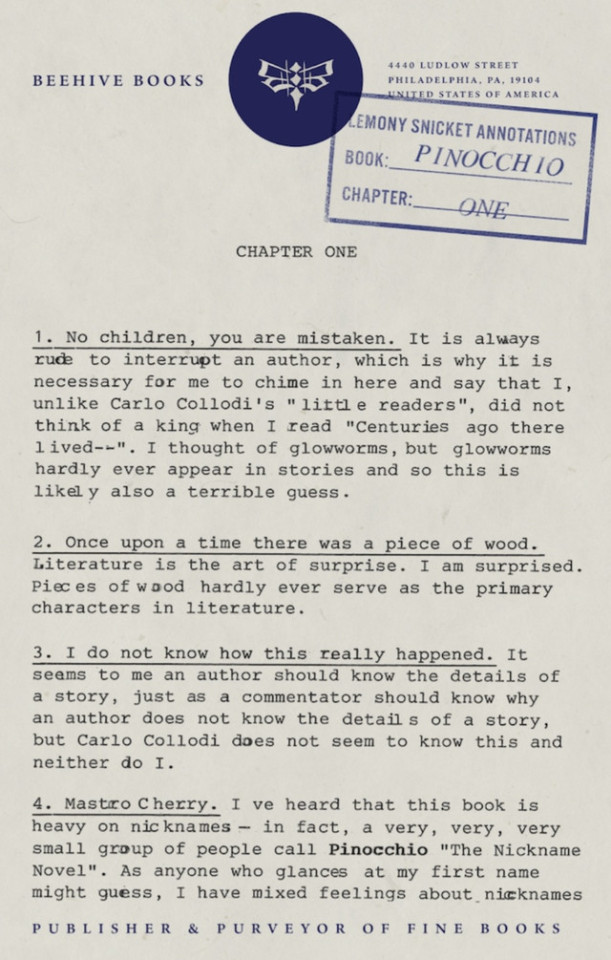
March 2023 - Lemony Snicket has collaborated with illustrator Mike Mignola for Beehive Books press to bring you an “Illuminated Edition” of Carlo Collodi’s classic “Pinocchio” with 50+ illustrations by Mignola, and 100+ annotations by Snicket (above is an example).
[It] features a full text annotation by Lemony Snicket, who takes the reader along with him for his own first experience of the story in all of its bubbling stew of anarchic madness, surreal symbolism and social commentary. Snicket's annotations are presented as removable typewritten sheets, complete with all the tell-tale revisions and ink-stains of an incipient authorial madness.
Mr Snicket says,
“for many years I have been curious to see if I, too, will join the tradition of readers completely transformed into lunatics from a reading of PINOCCHIO, and although Carlo Collodi died long ago, I like to think that somewhere, somehow, he is interested in seeing what I might have to say as I read this book and likely lose my mind. Perhaps you are too.”
Beehive Books need funding for printing and distribution of this book, and until April 21 you can donate to their project - as well as read more about it - here.
169 notes
·
View notes
Text
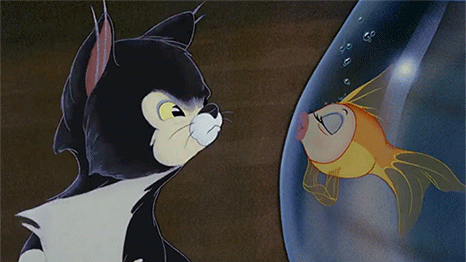
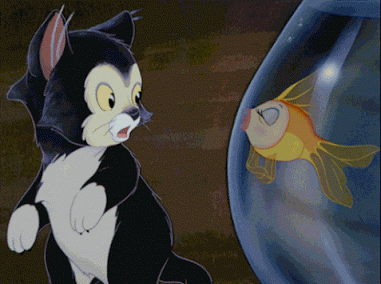
37 notes
·
View notes
Text
"It depends on the choice you make, truth.. or lie."

I'm back posting here again! Found out about this upcoming game recently and I literally can't wait for it! Here's my fanart of our protag P!
Ps: y'all can find my latest art on Instagram (same handle) i'm also more active there! 🌸
#lies of p#pinocchio#belle epoque#la belle epoque#soulslike#bloodborne#dark souls#neowiz#action rpg#video games#gaming#carlo collodi#fanart#digital art#digital painting#digital illustration#illustration#illustrator#artists on tumblr#lop
360 notes
·
View notes
Text
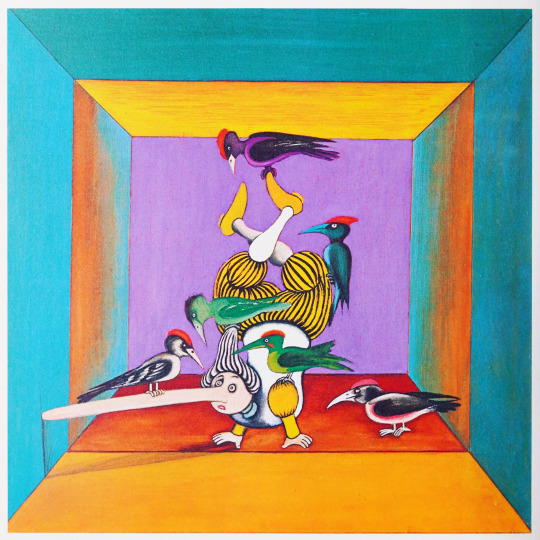
Olga Siemaszko, 'Pinocchio', ''Graphics'' #156, 1979
Source
36 notes
·
View notes
Text
"La coscienza è quella vocina interna che la gente ascolta di rado."
Le avventure di Pinocchio - Carlo Collodi
#Le avventure di Pinocchio#Carlo Collodi#Nella vita dei burattini#t.j. klune#frasi libri#libro#leggere libri#citazioni libri#libri#tumblr italia#aforismi tumblr#citazione tumblr#citazioni#citazioni tumblr#frasi tumblr
60 notes
·
View notes